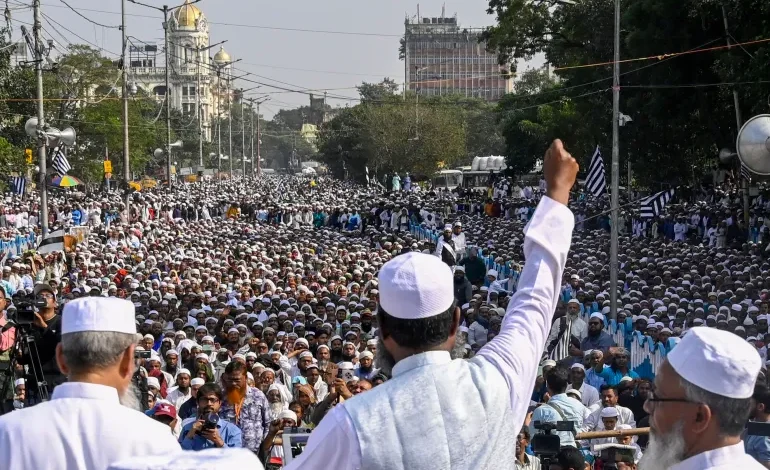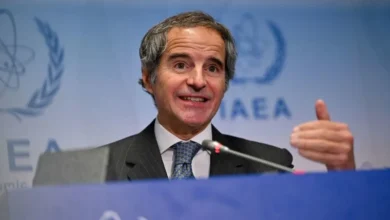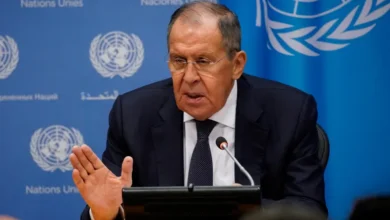Waqf bill: Why Indian Muslims worry about Modi plan for $14bn endowments

A proposal by India’s ruling Hindu nationalist government to change laws governing Muslim endowments in the country has triggered fear and a backlash among the minority community.
The government of Prime Minister Narendra Modi says it aims to root out corruption in the functioning of what are known as waqf bodies, which oversee these properties, to enhance their efficiency.
The ruling Bharatiya Janata Party (BJP) argues that the proposed changes are necessary for reforms but critics say that the move could leave properties donated by Muslims over centuries more vulnerable to disputes and demolitions.
The properties in question include religious institutions, mosques, shops, shrines, graveyards and thousands of acres of land.
So what do we know about waqf properties and who manages them? And why does the government want to change the waqf bodies?
What is waqf?
Waqf refers to personal property – moveable or immovable – that is permanently donated by Muslims for religious or charitable purposes.
The practice common among Muslim societies across the world goes back 14 centuries and has been integral to the socioeconomic and religious lives of Muslims in India since the 12th century.
While the beneficiaries of waqf properties can vary, a waqf can be established through a formal deed or orally, or by the longstanding use of the property for religious or charitable purposes.
Once a property is declared as waqf, it is transferred to God (Allah) and it cannot be sold or used for other purposes.
“Waqf is an essential feature of Islamic civilisations,” Faizan Mustafa, an academic and legal scholar, told Al Jazeera.
“The Western idea of trust was borrowed from the Muslim concept of waqf,” Mustafa, who is based in the southern Indian state of Telangana, told Al Jazeera.
There are three kinds of waqf. Public waqf involves schools and hospitals. Family waqf allows income to be shared with families and descendants of donors. Finally, the third category involves a mix of private and public use of donations. Private waqf, for instance, allows the proceeds to be used for a specific group, such as students.
In India, waqf properties are spread across nearly 1 million acres (approximately 1562.5 square miles), nearly twice the size of Mauritius. They are looked after by 32 government-established waqf boards in the country’s states and federally run union territories.
The boards in every state comprise government nominees, Muslim legislators (current, or where none are available, former lawmakers), scholars, and caretakers (mutawallis) who oversee property administration. All must be Muslims.
The Central Waqf Council (CWC) advises the federal government and oversees state-level waqf boards across India. The members are selected by the federal government, some elected and others nominated. It has to have at least two female members.
How has waqf historically been governed in India?
The governance of waqf properties in India is currently regulated by the Waqf Act of 1995.
However, there has been a legal framework in place since 1913, with the enactment of the Mussalman Waqf Validating Act under the British colonial rulers. This was followed by the Mussalman Wakf Act of 1923.
After India gained independence, the Central Waqf Act of 1954 was introduced, which was eventually replaced by the Waqf Act of 1995 to streamline the governance of these properties.
The last amendment in the Act took place in 2013 to strengthen protections for waqf properties. The amendments introduced penalties like imprisonment for encroachment and explicitly banned the sale, gift, exchange, mortgage or transfer of waqf properties.
It also widened the scope of waqf to include property donated by any person, including non-Muslims. But the current bill reverses this provision.
Framers of India’s constitution granted special provisions for religious minorities aimed at preserving their identity and culture. Article 26 of India’s constitution allows minorities to form and run religious and charitable institutions. Moreover, the state is not allowed to interfere with personal matters of religious minorities in the areas of marriage, divorce, inheritance and family relations.
What are the proposed amendments?
The bill proposes more than 40 amendments aimed at shifting the governance of waqfs from the boards to the state governments.
While waqf board members and their CEOs are currently required to be Muslim, the proposed amendment seeks to allow non-Muslims as members.
In the case of other religious and charitable trusts, however, CEOs are required to belong to their respective religion.
The Waqf Act mandates that disputes over waqf properties be resolved by a state-constituted tribunal with a judicial officer, a civil services officer and an expert in Muslim law. It is similar to a court but deals with only matters related to waqf.
Under the new bill, the tribunal’s decision could now be challenged in a high court. Under existing laws, tribunal decisions are final. Using an expert on Muslim law has also been removed from the tribunal, under the proposal.
Syed Mahmood Akhtar, a former official with India’s Ministry of Minority Affairs, said the waqf tribunal was created to take the burden off regular courts.
“The idea was to create a judicial body as strong as courts with a single work of only deciding waqf matters,” Akhtar, who framed the 2013 amendment, said.
The data shows that 40,951 cases are pending in tribunals, from which 9,942 cases were filed by the Muslim community against the institutions managing waqf.










